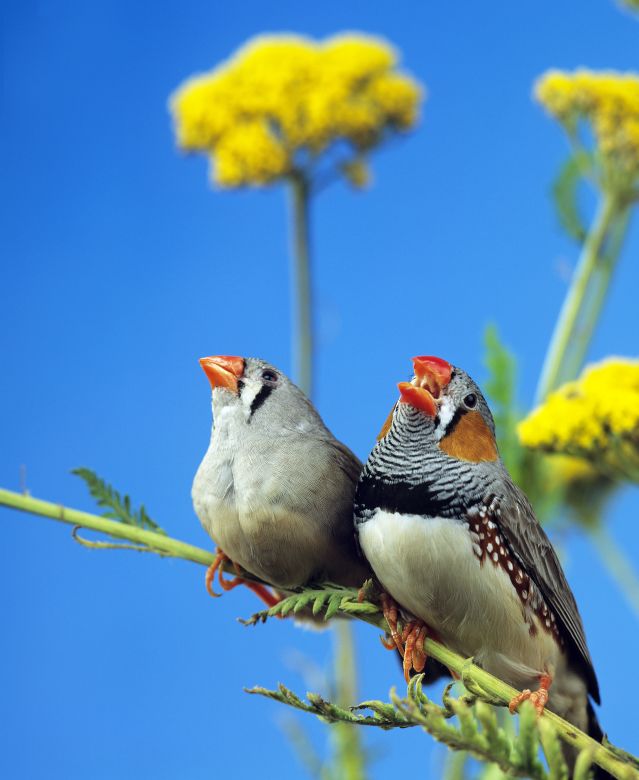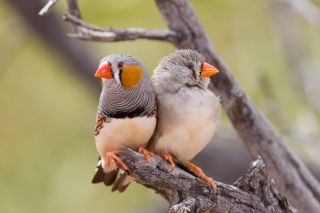Animal Behavior
Noise Pollution Makes Birds Flock Together
In response to traffic noise playback, captive birds become more social.
Updated January 23, 2024 Reviewed by Abigail Fagan
Key points
- Researchers recorded social behaviors of zebra finches before, during, and after exposure to traffic noise.
- Both individual sociality and flock clustering increased in response to traffic noise playback.
- Increased sociality could have consequences for disease transmission, social learning, and other processes.

Noise pollution is widespread, encroaching into more wild places and impacting animals in myriad ways. Research shows that human-made noise can affect how animals communicate, forage, protect themselves from predators, and use space within a habitat. Now, a new study suggests that such noise may also disturb social networks, with unknown ecological consequences.
Researchers from William & Mary recorded how captive zebra finches interacted with one another before, during, and after exposure to traffic noise. The birds were housed in an aviary with three rooms, with the playback speaker set up in one room to create a sound gradient in which the amplitude of the noise varied from high to low but was never fully escapable (the situation faced by most urban birds).
“Initially, I thought that the birds would try to get away from the traffic noise and go into the quieter room,” says study lead author Carly Hawkins, now a doctoral student at the University of California, Davis. “That was just not the case. They ended up spending more time together, instead.”
.jpg?itok=ewGO6BrH)
Hawkins and colleagues found that both individual sociality (a weighted measure of the number of social partners and the frequency of interactions with them) and flock clustering (a measure of the connectedness of the group) increased with the introduction of traffic noise.
Raising More Questions
Why might birds become more social when exposed to noise? The researchers have a few ideas. One possibility is that since traffic noise makes it more difficult to hear the approach of predators, the birds seek safety in numbers. Indeed, studies of other species have noted increased vigilance in response to noise playback.
Another possibility is that the increased social behavior acts as a buffer to the stress of noise pollution. Scientists have measured increased stress hormones in response to noise in some species. Being more social may mediate the effects of noise-induced stress.
Finally, the researchers suggest that the zebra finches’ behavior may be a response to what is known in humans as the cocktail party problem—the challenge of paying attention in a noisy room.
“If you are at a cocktail party and you want to have a conversation, your options are to talk louder, move to a quieter place, or move closer together so you can hear each other,” says Hawkins. “That last option could be what we are seeing here with these birds.”

The research team recommends future studies to investigate these potential mechanisms. They also say there is more to learn about the implications of increased social behavior in the wild. Increased connections between birds could contribute to the spread of parasites and disease. Changes in social behavior may affect processes like territory defense and mating decisions in still unknown ways. But Hawkins says the impacts of increased sociality may not all be bad. Increased familiarity could lead to decreased aggression or enhanced opportunities for social learning. At this point, it’s not known what increased social behavior might mean for birds in urban areas.
And since urbanization is not letting up, working out the implications of noise on wildlife has important implications for conservation efforts.
“Understanding how animals are going to respond to human disturbance, whether it will be beneficial or detrimental for a species, is essential,” says Hawkins. “These are important things to understand, knowing that the world has changed for wildlife and that it is going to continue to change.”
References
Hawkins, C.E., Pantel, J.H., Palia, S.T., Folks, C.C., and Swaddle, J.P. 2024. Zebra finches increase social behavior in traffic noise: Implications for urban songbirds. acta ethologica. Doi: 10.1007/s10211-023-00434-4.


